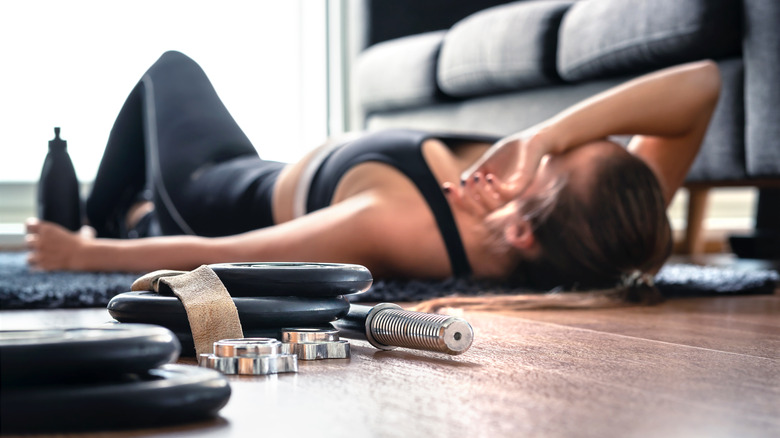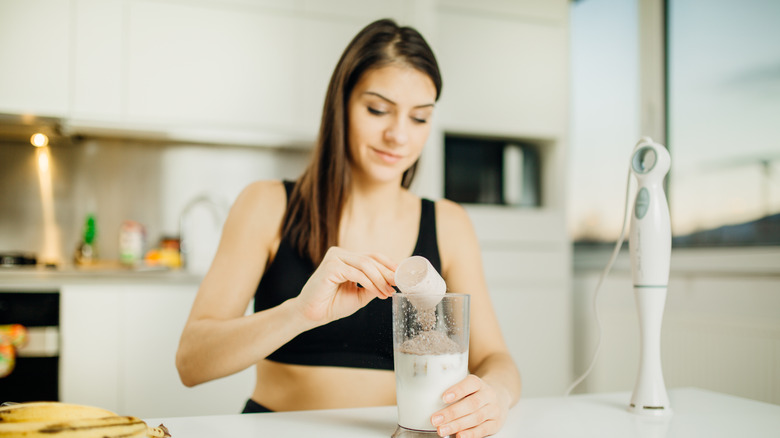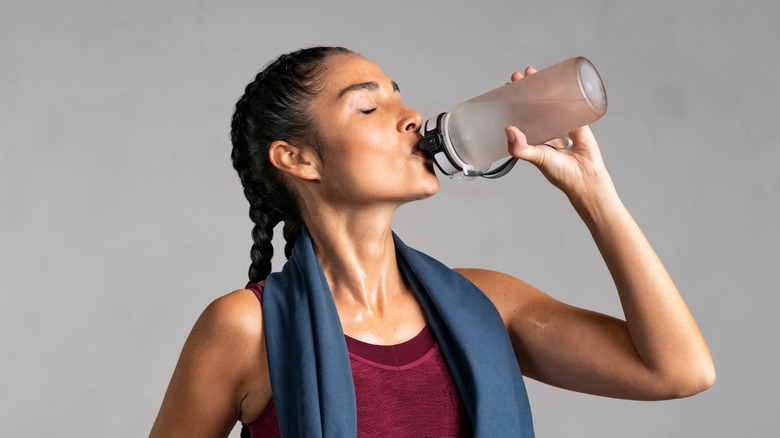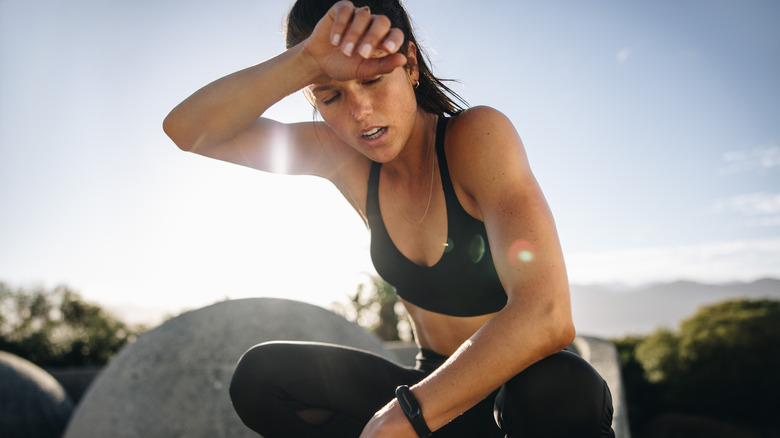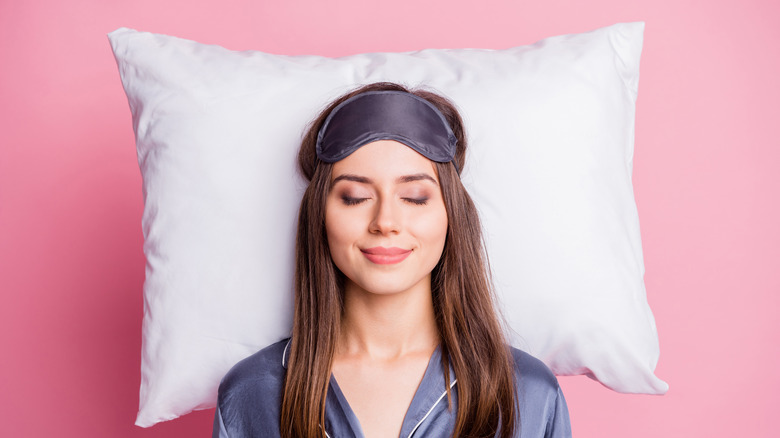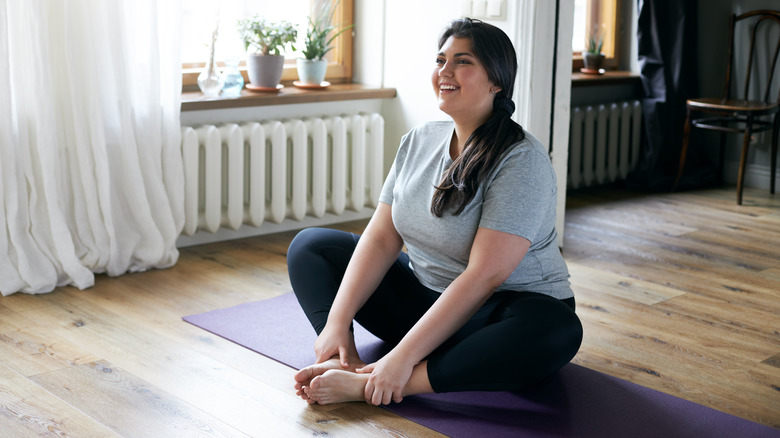The Real Reason You Feel Tired After Your Workout
Feel the burn, but not too much. Pushing yourself during a workout is fantastic for burning calories and building muscle, but you shouldn't feel utterly exhausted once you finish your sweat session.
However, it's normal to feel slightly worn out after your workout, since it elevates your heart rate and body temperature for a considerable amount of time. When you exercise, your body captures energy from the adenosine triphosphate (ATP) molecule (via the University of New Mexico). By doing so, your body works to stay active during your workout. In the event the exercise is too intense for your body, your ATP reserves can be depleted. Once there isn't enough ATP for your body to rely on, you can begin to feel extremely tired during and after your workout.
Aside from going too hard while on the treadmill or at the squat rack, several other reasons can account for the feeling of exhaustion after a training session. Fortunately, there are steps you can take to improve both your workout performance and your recovery.
You're not eating well
What you eat will either help or harm your gym efforts. For your body to function properly, it must be receiving the right kind and amount of food at the right time. While you don't have to diet religiously or follow a strict nutrition schedule, you have to be mindful of what you're consuming and when you're consuming it. By adequately fueling your body, you'll have adequate glucose throughout your workout, enhance your performance, and reduce your recovery time (via Self).
Self recommends nourishing your body with a protein shake or a small snack between 30 minutes and three hours before you work out. If you exercise after a meal, wait at least two hours before you begin. Per the American Heart Association, you'll need to eat between 50 and 100 calories every 30 minutes for a longer, high-intensity workout. Think simple carbs like a banana or an apple, so your body can easily digest them during your exercise. For low to moderate-intensity activities, you can hydrate with some water or a sports drink during your workout, but you don't need to eat anything during your training.
Once you're finished exercising, it's essential to refuel your body to maximize your results. Post-workout recommendations include water, carbs, and protein to aid in restoring and growing your muscles.
You're dehydrated
Throughout the day, your body loses water due to basic activities. And when you exercise and subsequently sweat, you lose even more. When the amount of water in your body is no longer at its usual amount, you'll go into a state of dehydration.
According to the University of Utah, dehydration can interfere with the body's heat regulation, meaning your body temperature and heart rate may rise. This will lead to you feeling more tired than usual during and after your exercise routine. In addition to dehydration increasing the difficulty level of your gym routine, it negatively impacts your brain's ability to function as well. The mental effects of dehydration include difficulty in making decisions, an inability to concentrate, and reduced motor control. Due to its effects on your body and brain, being dehydrated would naturally cause your performance in the gym to suffer.
Fortunately, preventing dehydration is relatively simple. First, make sure you're regularly drinking enough water before, during, and after you exercise. While it's essential to drink water throughout the day, you'll want to ensure you're drinking water while you break a sweat to mitigate any performance issues. ACE Fitness recommends getting up to 20 ounces of water two hours before your workout, up to 10 ounces every 20 minutes during, and up to 24 ounces per pound lost post-workout.
You may have an underlying health condition
Having a hard time staying awake can be attributed to more than just an intense fitness routine.
If your eyelids are constantly heavy and you frequently feel like taking a nap, you may have chronic fatigue syndrome (CFS), also referred to as myalgic encephalomyelitis (ME). Even though CFS is commonly found among adults between 40 and 60 years of age, anyone is susceptible to the illness. To determine if you have CFS, you must be diagnosed by a doctor. Unfortunately, due to the nature of the illness, it's hard to diagnose. There isn't a specific test to identify CFS, and it shares symptoms with other illnesses (via the Sleep Foundation).
Signs of CFS that you may be experiencing now may get better or worse as time progresses, and you might have different symptoms years from now (via MedlinePlus). Common symptoms include severe fatigue that never gets better even with adequate rest, sleeping difficulties, post-exertional malaise (PEM), and dizziness. While there's no cure for the condition, there are ways to manage it. Treatment options may include continuous airway pressure machines, cognitive behavioral therapy, modification of sleep habits, or changes in the bedroom environment. Also, since PEM causes your symptoms to worsen after physical activity, let your doctor know so they can tailor your treatment plan while taking your fitness routine into account.
You might not be sleeping well
An intense workout can lead to a good night's rest, according to Johns Hopkins Medicine. Not only can a workout help you get to sleep faster, but it can also improve sleep quality. In particular, exercising increases the duration of slow-wave sleep, also known as deep sleep, that one can get. During slow-wave or deep sleep, both your brain and your body are reinvigorated. Moreover, exercise aids in mood stabilization and decompression of the mind, which can help you get better sleep.
The proper time to exercise is highly debated. Since exercise releases endorphins and increases body temperature, many have strong opinions on the best time to hit the gym. However, the right time to exercise depends on your body and your lifestyle. Based on those factors, you may actually be working out at the wrong time. For example, some people say that working out too close to bedtime is detrimental to sleep. On the other hand, some people report they don't have issues if they exercise late at night. Ultimately, though, getting exercise at a time that works best for you will help you get a good night's sleep.
You're skipping cooldown
Cooling down is just as important as warming up and the actual workout itself, per ACE Fitness. Cooling down after your workout will help prevent injuries, reduce soreness, clear lactic acid, release endorphins, and keep your blood flowing. Thus, failing to incorporate even just a 10-minute cooldown period into your workout can be detrimental to your health.
After your last rep, your body will have a faster heart rate, a higher temperature, and dilated blood vessels (via the American Heart Association). As a result, if you stop exercising without giving your body time to cool down, you may feel unwell or even faint. Specifically, if your heart rate or blood pressure drops too quickly, you may feel lightheaded and lose consciousness. By gradually cooling down your body — slowing down your heart rate, lowering your body's temperature, and regaining mental focus after physical activity — you'll put yourself at less risk post-workout.
Your cooldown exercise doesn't have to be complicated; stretching will usually suffice. Once your heart rate reaches and stays under 120 beats per minute, you'll be ready to go about your day or night as normal.

